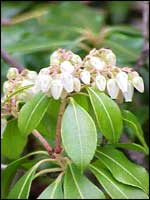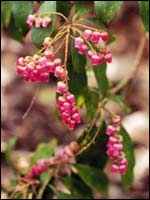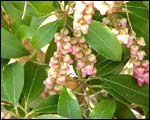Plant Profile: Japanese Pieris Family: Ericaceae Type: Evergreen bush Size: 3m tall by 2.5m spread This popular spreading bush is native to Japan, Taiwan and Eastern China with more than 40 named cultivars and several hybrids listed. Japanese Pieris is also
known by the names Japanese Andromeda and Lily of the Valley shrub,
due to the similarity of the flowers to those of Lily of the Valley. In late winter to early spring 10-15cm long racemes of white or pink flowers appear and last for approximately three weeks. These flowers are set the year before and appear as bead-like pink buds throughout winter. These attractive buds look very pretty against the dark green foliage. The flowers are faintly perfumed and the bark is a reddish brown which becomes scaly and split. Japanese Pieris is useful as a hedge or shrub border or as a single specimen. Other varieties may be used as foreground borders such as 'Bisbee Dwarf', a compact plant with smaller-than-normal leaves. Pieris japonica prefers partial shade and does not perform well in full sun. Plant in a rich, moist, acidic soil which is well rained. Pieris must have protection from strong winds and drought. Growing: The flowers are susceptible to frosts. Ensure the flower heads are removed as soon as possible after blooming. Do not prune in winter or you will lose the flower buds which have formed for the following season. Propagation is by hardwood cuttings removed in winter, green wood tip cuttings removed in spring, or from seed, also in spring. Watch out, as leaf spot, scale and mites love this bush.
|
Home | Journal
| Newsletter | Conferences
Awards | Join
RNZIH | RNZIH Directory | Links
© 2000–2026 Royal New Zealand Institute of Horticulture
Last updated: June 2, 2004


 Botanical
name: Pieris japonica
Botanical
name: Pieris japonica The
emergence of the almond-shaped leaf growth is a spectacular sight,
as the leaves start out bronze-coloured and turn a glossy dark green
with a lighter green shade underneath.
The
emergence of the almond-shaped leaf growth is a spectacular sight,
as the leaves start out bronze-coloured and turn a glossy dark green
with a lighter green shade underneath.  Ideal
Conditions:
Ideal
Conditions: